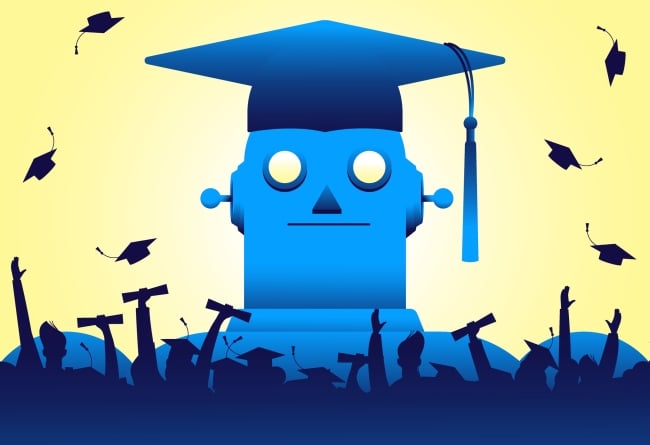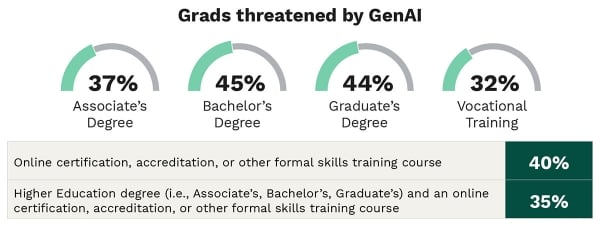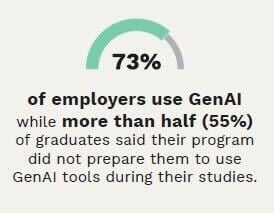You have /5 articles left.
Sign up for a free account or log in.

A majority of recent college graduates feel unprepared for the workforce and want generative AI to be taught in college courses, according to a new report.
Moor Studio/DigitalVision Vectors/Getty Images
A majority of college graduates believe generative artificial intelligence tools should be incorporated into college classrooms, with more than half saying they felt unprepared for the workforce, according to a new survey from Cengage Group, an education-technology company.
The survey, released today, found that 70 percent of graduates believe basic generative AI training should be integrated into courses; 55 percent said their degree programs did not prepare them to use the new technology tools in the workforce.
The share of respondents who expressed uneasiness about their facility with generative AI varied by age; 61 percent of Generation Z graduates, or those younger than 27, said they felt unprepared, compared to 48 percent of millennials (28 to 43 years old), 60 percent of Gen Xers and 50 percent of baby boomers.
To conduct the survey, Cengage Group polled 974 recent graduates—including nontraditional adult learners—from two- and four-year institutions, as well as those who received skills certificates in the last year.
“There’s a fair amount of nervousness, saying, ‘What does it mean to me, my job prospects, and am I ready?’” Cengage Group CEO Michael Hansen said, adding that he believes some of the early AI alarmism is fading as expectations for the technology become more realistic. “The education system, as usual, plays a bit of catch-up, saying, ‘It’s important, but we haven’t built the curriculum we need to.’”

A new Cengage Group report shows recent college graduates across the board have concerns about keeping pace with generative artificial intelligence.
Cengage Group
The lack of AI knowledge among graduates coincided with a general decline in optimism about the job market: More than a third of graduates (39 percent) said they feel threatened that generative AI could replace them or their job entirely.
“That’s spot on to what I’ve seen and heard,” said Ray Schroeder, senior fellow at UPCEA, an online and professional education association, and a contributor to Inside Higher Ed. “Those students are looking ahead; they’re looking at not just the next class but their careers and what the HR department or owner of the start-up is going to look for in students. And it’s the ability to use the rapidly evolving technology that’ll make a huge difference.”
Employers report a skills gap in the ability of workers to use generative AI. Roughly half of 1,000 employers polled said they expect hires to lack generative AI skills. Nearly two-thirds (62 percent) believe both prospective and current hires should have foundational knowledge of generative AI tools, while more than half (58 percent) said they are more likely to interview and hire candidates with AI experience.
Universities are slowly incorporating generative AI into systems ranging from financial aid to dining services, but many professors are still wary of the technology and unsure how to use it. According to a June survey by the higher education consulting firm Ithaka S+R, two out of five faculty members are familiar with AI, but only 14 percent said they are confident in their ability to use it in their teaching.

While many employers are adapting to generative AI, universities have not kept pace.
Cengage Group
“Higher education has made strides in being more responsive to the skills that employers need, but in order to do that they need to have visibility into the skills that employers are looking for,” said Tiffany Hsieh, director of innovation programs at JFFLabs, a subset of Jobs for the Future. “Cross-sector collaboration between education and employers will be the key to helping higher education be more agile in response to the skills we need in an AI-enabled world.”
Schroeder encouraged universities to require students to take either an introductory course on generative AI that culminates in a project they can use in their portfolio or a senior-year capstone course that ensures they get the most up-to-date skills.
“It’ll be so pervasive in business that those who don’t quite recognize it, or those who deny it [can’t ignore it],” he said. “But I’m here to tell you, this is unstoppable. It’s so efficient and powerful, it won’t be denied in commerce, business and industry.”
The study also found an improvement in graduates’ perceptions of the value of higher education: nearly three-quarters (73 percent) said higher education was worth the cost, up from 52 percent in 2023 and 68 percent in 2022.
Hansen believes the spike in perceived value could stem in part from universities’ efforts to impart more technology skills to students.
“I think there’s an indirect link to technology; people are saying, ‘I’m living in a somewhat more unsure environment and education gives me the skill set I need to be competitive,’” he said. “The U.S. education system has rightfully taken a lot of flak [from students] saying, ‘It’s too expensive’; They don’t see the value. And on the flip side, universities are responding and focusing on value, saying, ‘If you spend tens of thousands of dollars on education, you should get a better job because of it.’”





